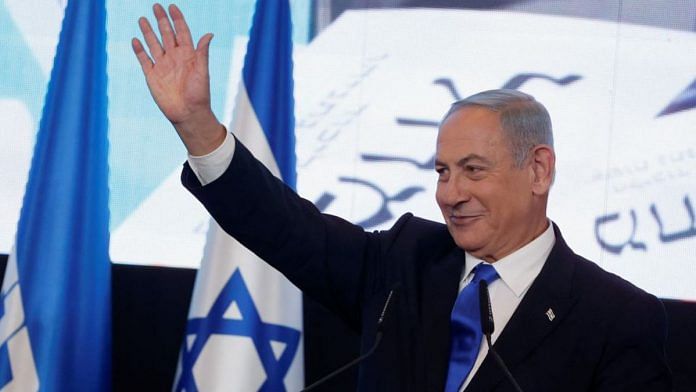The families and friends of the Israelis held hostage or killed by Hamas did not conduct solemn candle marches to mark six months of the 7 October attack. Instead, they held Israeli flags and torches and brought the country to a halt.
For long, the families of the hostages maintained a distance from the anti-government protesters—the liberal, secular, progressive, feminist, and Left who led the successful Kaplan Street protest against Prime Minister Benjamin Netanyahu’s judicial reforms last year. They used to assemble in front of the Tel Aviv Museum of Art, in an open space called Hostages Square (kikar hatufim). The families comprise diverse people with different political preferences and ideological stances, and they didn’t want to face the polarising question of being pro- or anti-Netanyahu.
After anxiously waiting for six months, they are broken and desperate—the Netanyahu government has failed to bring their loved ones back. And so they want two things: an immediate hostage deal with Hamas rather than reliance on military operations in Gaza, and early elections in Israel.
Also read: Palestinians don’t trust Hamas with their future. They need leaders, not a militia
Military operations in vain
Any nation would find it extremely hard to deal with the situation Israel has been in for the past six months. An armed group taking civilians as hostages and ambushing communities.
Israel is known to have a policy of not bargaining with ‘terror’ groups. But in 2011, Netanyahu negotiated a significant deal with Hamas for one soldier, Gilad Shalit, by freeing 1,027 Palestinian prisoners. One of those freed was Yahya Sinwar—the mastermind of the 7 October attack. While making that deal, Netanyahu said that “as a leader who daily sends out soldiers to defend Israeli citizens, I believe that mutual responsibility is no mere slogan – it is a cornerstone of our existence here”. Gilad Shalit was in captivity for five years and most people were keen to see him return alive. So, when Netanyahu made the deal, it benefitted his populism.
After the 7 October attack, Netanyahu, who was riding high on international solidarity, adopted an ambivalent strategy—clumsy for some, no strategy for others. He declared that “it is a turning point for all leaders and nations, the civilised world, to decide if we are willing to fight for a future of hope and promise; or surrender to tyranny and terror”. Destroying Hamas became his and most other Israeli leaders’ mantra, and they were overconfident. The hostages would come home for sure in this process, or so they thought.
But Sinwar was a knottier issue than expected. He has escaped the Israeli army for all these months, while allegedly managing more than a hundred hostages in tunnels in Gaza. It’s a gamble compared to any strategy that Netanyahu, his defence minister Yoav Gallant, and his war cabinet have come up with.
Also read: Indian left is wrong about Hamas. Even Palestinians don’t support ‘rockets as resistance’
A solution still in sight
The United States and Arab states like Egypt, Jordan, and Saudi Arabia have been more than generous in negotiating with Israel.
They’ve also suggested a better long-term strategy than war that Israel could accept, in principle for now—a two-state solution with the Palestinian Authority and allowing an Arab coalition of partners to take over the governance of Gaza. The offer included diplomatic normalisation with Saudi Arabia as well. The earlier mentioned Sunni Arab states had earlier put aside the Palestine issue and sided with Israel in fighting the threat posed by Iran and Hamas, which for years has been deeply influenced by Iran and its proxy Hezbollah.
The famous Israeli diplomat Abba Eban once said that men and nations often act wisely after exhausting all other alternatives. Israel cannot defeat, let alone eliminate, Hamas on its own—neither now nor in the distant future. And continuing to deny the Palestinians their rights will certainly be more problematic as the Palestine question has become an international issue once again.
The offer for a two-state solution has not yet expired and Saudi Arabia is willing to normalise relations with Israel. But Netanyahu’s precarious leadership and the age-old unilateralism of Israeli foreign policy continue to miss the obvious.
Dr Khinvraj Jangid writes from Tel Aviv. He is Associate Professor and Director, Centre for Israel Studies, Jindal School of International Affairs, OP Jindal Global University, Sonipat. He is visiting faculty at Ben-Gurion University of the Negev, Israel. Views are personal.
(Edited by Theres Sudeep)



